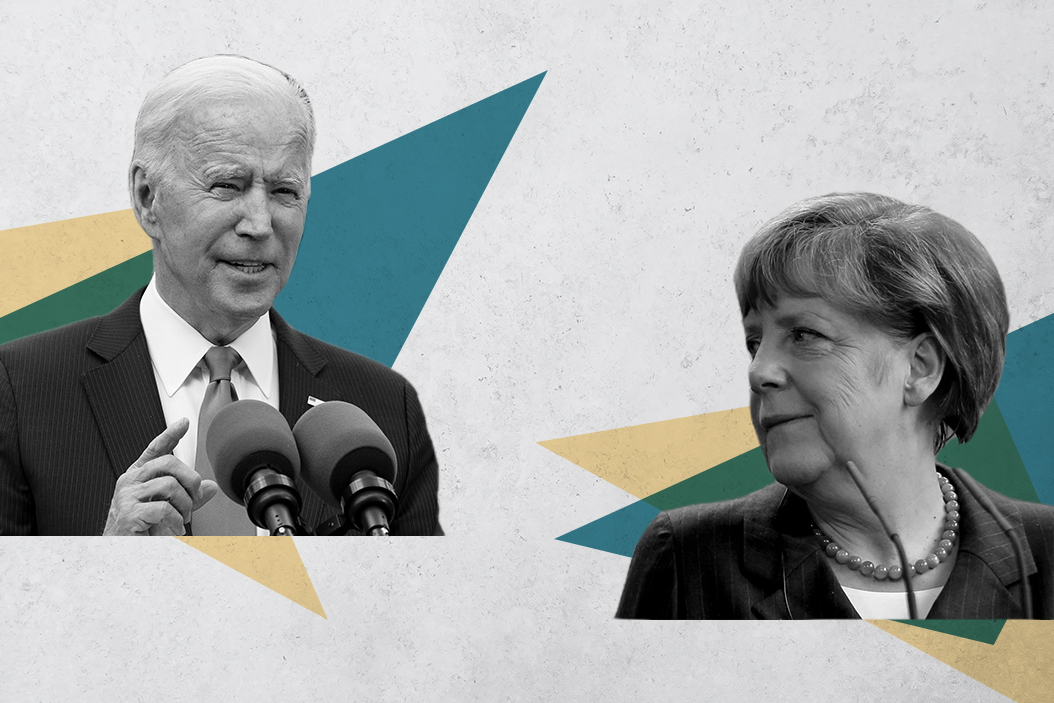July 14, 2021
When it comes to the US, German Chancellor Angela Merkel has seen a lot over the past 16 years. She's weathered the hubris of the George W. Bush presidency, worked closely with the Obama administration to manage a slate of global catastrophes (Great Recession, Ebola outbreak) and navigated the chilling of US-German relations under Donald Trump. This Thursday, she will meet with President Joe Biden at the White House.
Both Biden and Merkel have been around the block — many times — and it's clear that they enjoy a close working relationship and mutual respect for one another. But mending the bilateral relationship in the post-Trump era is not as simple as many hoped. Disagreements on a host of thorny issues persist, and they will be front and center when Biden and Merkel awkwardly elbow-bump this week.
Russia and the Nord Stream 2 pipeline. For all of their apparent comity, Biden and Merkel have been at loggerheads over the construction of this pipeline, which, if completed, would massively increase the shipment of natural gas directly from Russia to Germany under the Baltic Sea. Germany says the project is crucial to offset dwindling gas production in Europe, as well as to help it meet its goal of phasing out coal-powered plants by 2038.
But Washington says that the project would allow an already-brazen Kremlin to weaponize gas exports in order to harm US ally Ukraine. Until now, that country has been a major transit country for Europe-bound Russian gas exports. But if Nord Stream 2 enables the Kremlin to cut gas to Kyiv without harming its major EU consumers, Moscow will surely be emboldened to do just that. Merkel said this week that Germany will safeguard Ukrainian interests, but Kyiv doesn't seem to be buying it.
As part of a bid to patch things up with Germany, Biden recently waived sanctions (imposed by the Trump administration) on the company behind Nord Stream 2. But the move earned him much condemnation at home, with both Republicans and Democrats saying the decision was a boon for Russia.
Afghanistan and NATO shenanigans. If Washington is peeved over Germany's unilateral action with Nord Stream 2, well, Berlin is equally riled up about the US' withdrawal plan in Afghanistan, which was given the go ahead without any consultation with the Germans. Germany has had the second biggest military presence in Afghanistan, sending 150,000 troops over the past two decades. Moreover, the Germans are still wary after Trump announced last year that the US would pull 12,000 troops stationed in Germany, offering no strategic rationale for the move. Although Biden walked that back, the US going at it alone in Afghanistan has only reinforced Germans' misgivings.
What to do about China. Countering China's rising global influence and domestic repression is a Biden administration priority, and the only thing that seems to unify Congressional Democrats and Republicans. The US president has said that cooperation from European and Asia-Pacific allies is key to containing China.
But Merkel, on the other hand, has tried to boost EU ties with Beijing, and has long backed a now-stalled EU-China investment deal, even over US objections. The disagreement also extends to Chinese telecommunications: while Washington has long waged a campaign against Chinese tech titan Huawei, citing cybersecurity concerns, Berlin announced in February that it will not ban Huawei-made equipment from its 5G networks. Merkel said at the time that while the US and Europe should develop a "joint agenda on China," this does not necessarily "mean that our interests will always converge."
Complicating matters further is the fact that this meet-and-greet comes just 10 weeks before German elections that will mark the end of Merkel's 16 years in power. Merkel will be looking to cement her domestic political legacy, and is well placed to do so, given that her CDU/CSU coalition is currently leading in the polls after a rocky few months. But acquiescing to the Americans on Nord Stream 2 and China are not popular plays with German voters. Interestingly, 53 percent of German respondents told the European Council on Foreign Relations that Americans cannot be trusted in the post-Trump era.
No looking back. In the lead-up to US elections last year, Heiko Maas, Germany's foreign minister, said: "Everyone who thinks everything in the trans-Atlantic partnership will be as it once was with a Democratic president underestimates the structural changes." This will be on full display as Merkel meets with her last US president.
More For You
Think you know what's going on around the world? Here's your chance to prove it.
Most Popular
Donald Trump alongside Nigel Farage amid a television interview at his Trump Turnberry course in South Ayrshire during his visit to the United Kingdom, on May 3, 2023.
PA via Reuters
The US government will reportedly fund MAGA-aligned parties and think tanks in Europe. But with US President Donald Trump’s favorability in Europe so low, do they even want the money?
- YouTube
Zelensky agrees: elections matter #PUPPETREGIME
As more small businesses move sales, payments, and customer relationships online, they unlock new opportunities, but they also become easier targets for cyber-criminals and other threat actors.
© 2025 GZERO Media. All Rights Reserved | A Eurasia Group media company.
